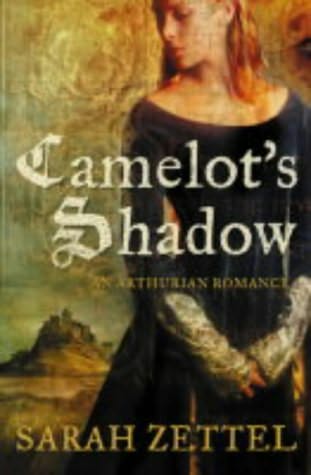In Camelot's Shadow
by Sarah Zettel

Reviewed by Coral
Riding home from King Arthur's coronation, Lord Rygehil is forced to spend the night in an abandoned hovel while his wife, Jocosa, lies at death's door. Only the hovel is not as abandoned as he believes. Instead it is home to a dark sorcerer, Euberacon, who offers to use his powers to save Jocosa's life if Rygehil will give him their first born daughter's hand in marriage. For his wife's life, Rygehil agrees.
When Risa comes of age, she is horrified to learn of this unholy arrangement her father has made and runs away, intent on hiding in a convent. Euberacon, however, learns of this and tries to capture her along the way. She is saved by Gawain, greatest of Arthur's champions.
Now Risa is caught up in Gawain's mission, as he rides to Camelot to warn Arthur of a planned Saxon invasion, all the while trying to stay out of the clutches of Euberacon. But can she save herself from the heartache that is falling in love with Gawain?
I had a few issues with this book, mainly about how the author chose to portray her pagan-Saxon characters. The main thing about the time period in which Arthur is believed to have lived is that it was a time of instability after Rome abandoned Britain and before the Anglo-Saxon tribes gained control over the island. I disliked that all pagan characters were lumped in with the "bad guys" because that's not really how it was. Christianity is what ended the Dark Ages, when the Anglo-Saxons fully converted. But, before then, I believe Britain would have been the same religious mix that existed in the last days of the Roman Empire. I mean, sure the Emperor had converted to Christianity, but the soldiers and common people still worshipped other gods. The characterization of Britain as all-Christian didn't really seem authentic.
I hated the way the Saxons were written almost as much as I hated how they were shown in King Arthur. First off, they had been raiding England for a long time and were well-settled, so it is doubtful there were few of them left in England in the time of Arthur, as the book suggested. Secondly, I didn't like how they were shown to be cliché vicious, pillaging brutes. Much like the Vikings, I think their reputation has suffered with time. And this thing about their helmets being shaped like boar's heads? I've Googled Ancient Saxons helmets and, from what I could tell, not true.
I hate prologues that give away too much of the story; this time round they already tell us pretty much how the Gawain-Risa love story ends.
The romance between Gawain and Risa seems rushed, and not all that realistic. That may be because I'm biased against romance in non-romance stories, but I don't see how two characters kissing after they've known each other three chapters is a love story. It should be more fleshed out, done at a slower pace, maybe over more than one novel.
Why is it that the Gawain, Gareth, Agravaine family is never a happy one? They always seem to be at odds with each other in the books I've read about the Arthurian legend. Why can't they be a functional family who will go to the mats for each other, just once? Plus, the author gets the name of the fourth brother wrong. It's Gaheris, not Geraint.
Why is it authors always try to shoehorn fantasy into the Arthurian legend? Potions, fine. Visions, I can believe. Omens, why not? But someone transforming herself into a raven? A little more history and a little less fantasy please. Personal preference though, you might disagree.
What was so wrong with what Rygehil did? He was trying to save his wife's life. She was going to die. He loved her with everything he was and he made a not so smart choice trying to save her life. When it gets revealed he suddenly becomes this villain that his wife and daughter hate, and it just gets worse.
For that matter, I didn't find Agravaine all that wrong either. Gawain might disagree, but the middle of a battle zone is not the place to upset one of Arthur's liege men. Agravaine was right to let Rygehil take custody of his daughter and was right to tell Gawain to wait for a better time to address the subject again. But of course Gawain goes running off to save her, because that's what men in love do in these situations: disregard every other priority and rescue their "true love".
Risa is another one of these Mary Sue-like characters: pretty, a good fighter, witty, and on and on. An original character dropped into the Arthurian legend, she becomes central to the story in a way all Mary Sues do eventually, and I hated it.
For all of that, the author's style of writing was very captivating, and I found myself enjoying the book even when I didn't quite want to. It's principal, that much wrong with it and it shouldn't be a good read, but it had it's moments.
Grade: C